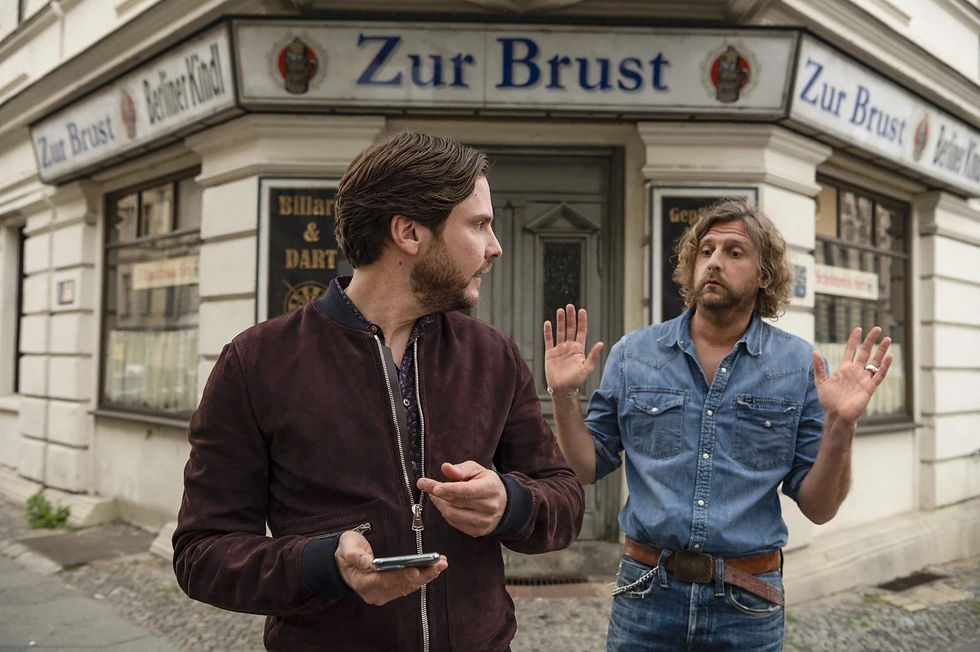The directorial debut of the Inglourious Basterds star and Marvel's Baron Zemo is a simple movie about a dialogue between generations and a heavy acting burden.
Successful actor Daniel (Daniel Brühl), before his trip to London, where he is supposed to audition for a role in a Hollywood blockbuster, walks into a small Berlin bar - to while away the time and at the same time rehearse a pathetic monologue in silence. The latter, however, does not work out in any way: you have to communicate with agents and producers on the phone, then the fans get it, and the stern man at the counter (Peter Kurt) is always gazing at him. As it turns out later, his name is Bruno, and he is Daniel's neighbor, who has long been watching from the windows of his old apartment for his fashionable loft. He wants to talk in order to express everything about the acting falsity, and at the same time to share thoughts about the personal life of a Hollywood star, about which Bruno knows too much for some reason.

Daniel Bruhl's directorial debut was born out of a very real situation - once the actor, as he himself says, was sitting in a Spanish bar, and one of the visitors began to gaze obsessively at him. The artist, unlike his on-screen alter ego, did not dare to talk with the silent observer. But I thought that this could make a good movie - if you take the situation and come up with some kind of effective resolution. Another Daniel, Kelmann (the author of the novel "Me and Kaminski", in the adaptation of which Bruhl played in the film), took up the work on the script on the idea of Bruhl, and the star of "Inglourious Basterds" decided to shoot a movie as a director and play the main role - in fact, the very myself. The hero and the artist are related here not only by the name: both Daniels (both real and on-screen) are half-German, half-Hispanic, both are married to psychologists, starred in movie comics and successful American TV series. Both, importantly, grew up in Cologne and know about life in East Berlin only by hearsay: this will be the first stumbling block between the actor and Bruno.

But for all the similarity in details, this Daniel is not entirely real. He is an outright caricature, a parody, an emphatically selfish narcissist actor (apparently, also not very good), who comically curses himself with the agents and does not see the real life around. Brüel convincingly proves that everything is in order with his self-irony, and perhaps he thinks too bad of himself - or he deliberately pauses so that God forbid he is not accused of excessive admiration for his own person. In fact, in trying to portray himself as an idiot, he goes even too far, because of which the whole film suffers as a whole. For some reason, Brüel plays on one note, says any phrases with a strange aspiration - the same with which he rehearses his next role in a stupid film comic strip (probably, there is a joke that he just already entered the character and cannot get out of it) ... In one scene, Bruno accuses the actor, they say, he is the same in any film - his personality obscures the character. And this is ironic: in "In the Neighborhood" Bruhl himself is completely invisible, although he plays himself.

He is not a man here, but a convenient symbol - like Bruno, seemingly his complete opposite. Their dialogue, which stretched out for almost the entire film, interrupted by interludes and uncomplicatedly divided into acts, is, of course, interesting not by personal conflict, but by an attempt at a clash of contrasts: West and East, rich and poor, hard workers and bohemia, fame and unknown, old age and youth. Like many authors before him, Bruhl, within the framework of chamber cinema, tries to cover the problems of a national, if not global scale (in the same way, for example, Sunset Limited did - also, by the way, filmed by an actor). With just two characters, Kelmann's script places the viewer in the complex political and cultural context of modern Germany, long united but still torn apart by internal contradictions.
“Next Door” is a prime example of a film whose authors confuse the concepts of “situation” and “history”. Brüel and Kelmann pay a lot of attention to the exposition, through details and phrases they build their rich cinematic world: suddenly it turns out that Bruno once played in a local rock band, which means that his cultural conflict with Daniel is much more unobvious; the sad fact about the actor will be revealed - he wanted to play Beethoven, but he has to pull information from the producers about the next flat comic book hero with tongs. This is all curious in itself, but only the film is not particularly used: "Next Door" creates an interesting psychological context for the characters, but does not know at all what to do with it - somewhere in the middle, the plot starts to slip and wander in a circle. Everything should, in theory, be corrected by a small twist, only that in fact turns out to be a spit in the sea - and does not really change anything. On the contrary, it even makes it worse: it reduces the entire deep conflict of the heroes to a simple story of adultery and a secret that necessarily becomes obvious.
Comments